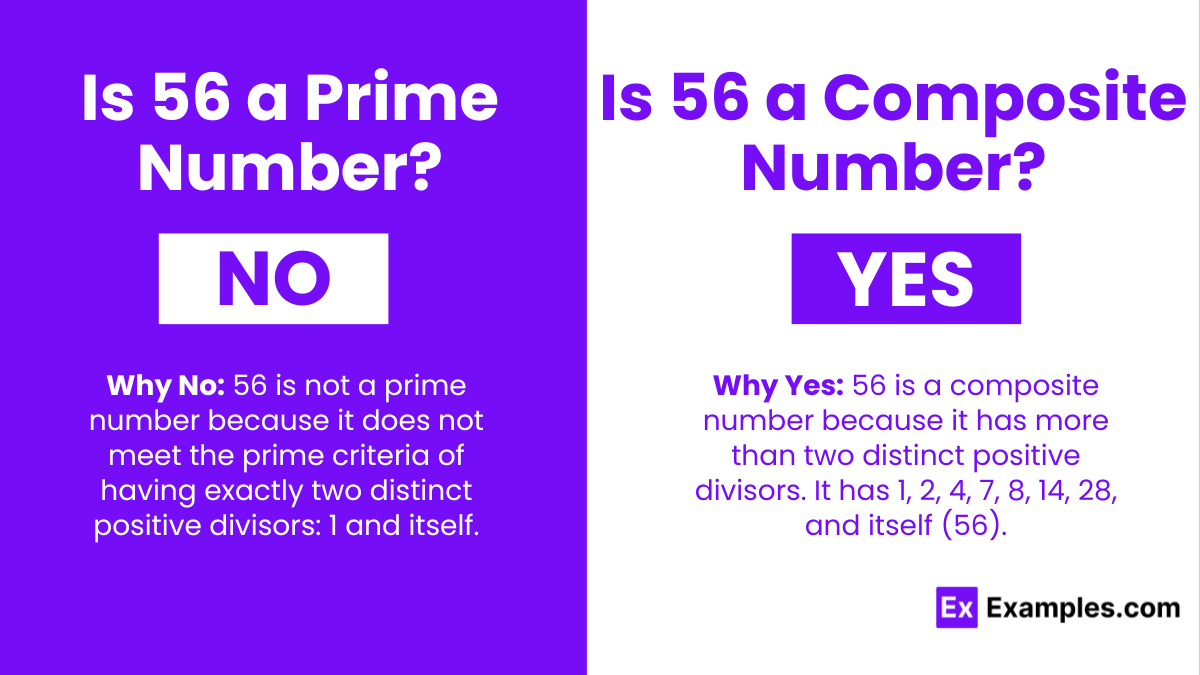Is 56 a prime number or a composite number?
Prime
Composite
Neither
Both


No – 56 is not a Prime Number.
Why No: 56 is not a prime number because it does not meet the prime criteria of having exactly two distinct positive divisors: 1 and itself. Check if any number is prime or not
Yes – 56 is a Composite Number.
Why Yes: 56 is a composite number because it has more than two distinct positive divisors. It has 1, 2, 4, 7, 8, 14, 28, and itself (56).
| Property | Answer |
|---|---|
| Is 56 a prime number? | No |
| Is 56 a composite number? | Yes |
| Is 56 a perfect square? | No |
| Factors of 56 | 1, 2, 4, 7, 8, 14, 28, 56 |
| Multiples of 56 | 56, 112, 168, 224, 280, 336, 392, 448, 504, 560 |
| Cube Root of 56 | 3.825 |
| Square of 56 | 3136 |
| Square Root of 56 | 7.483 |
| Is 56 a Perfect Cube? | No |
| Is 56 an Irrational number | No |
| Is 56 a Rational number | Yes |
| Is 56 a Real number | Yes |
| Is 56 an Integer | Yes |
| Is 56 a Natural number | Yes |
| Is 56 a Whole number | Yes |
| Is 56 an Even or odd number | Yes (56 is an even number) |
| Is 56 an Ordinal number | Yes |
| Is 56 a Complex number | Yes (as all real numbers are also complex numbers) |
The factors of 56 are 1, 2, 4, 7, 8, 14, 28, and 56. 56 is not a prime number because it is divisible by numbers other than 1 and itself, highlighting its nature as not solely divisible by 1 and itself, thus being a composite number. It has multiple factors, making it clear that it is a composite number and not a prime number.
56 is recognized for its status as a composite number, marked by its divisibility by numbers other than just 1 and itself. The number 56, as a composite number, holds a distinct place in mathematics and conceptual frameworks. Its properties as an even number, a composite, and a natural number make it a notable figure in various mathematical discussions.
The nearest prime numbers to 56 are 53 and 59. 53 is the closest prime number less than 56, and 59 is the closest prime number greater than 56.
56 itself cannot be a coprime number; co-primness is a property between two numbers that share no common factors other than 1.
The positive pair factors of 56 are (1, 56), (2, 28), (4, 14), (7, 8), showing combinations that multiply to 56.
Text prompt
Add Tone
10 Examples of Public speaking
20 Examples of Gas lighting
Is 56 a prime number or a composite number?
Prime
Composite
Neither
Both
Which of the following statements is true about the number 56?
It is a prime number because it can be divided by 1 and itself only.
It is a composite number because it has more than two divisors.
It is neither prime nor composite.
It is prime but not composite.
If you were to list all divisors of 56, how many would you find?
2
4
6
8
What does it mean if a number is classified as composite?
It can only be divided by 1 and itself.
It has more than two positive divisors.
It is always an odd number.
It is a prime number.
Is 56 a prime number if it can be factored into 2 × 28?
Yes
No
Only if it has additional factors
It depends on the other factors
What is the smallest divisor of 56 other than 1?
1
2
3
4
Which property is not true for a composite number like 56?
It has exactly two distinct positive divisors.
It can be divided by more than just 1 and itself.
It can be factored into smaller positive integers.
It is not a prime number.
When 56 is divided by 7, what is the quotient?
2
4
6
8
How can you express 56 as a product of its prime factors?
2 × 2 × 2 × 7
2 × 2 × 3 × 7
2 × 2 × 2 × 2 × 7
2 × 3 × 5 × 7
If a number is neither prime nor composite, what can you infer about it?
It is always a negative number.
It must be zero or one.
It is a complex number.
It is a prime number.
Before you leave, take our quick quiz to enhance your learning!

